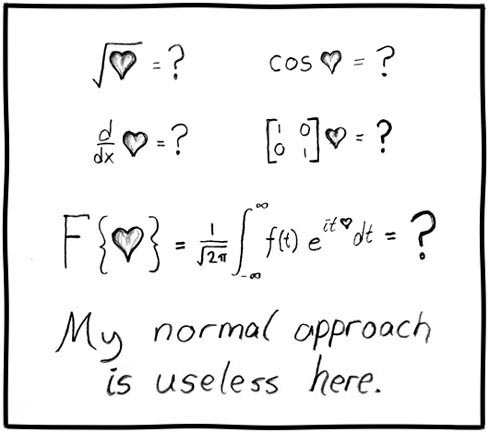This may have (probably has) been solved in elaborate detail in other texts, but I haven’t heard of them and maybe someone can enlighten me.
I was thinking about how different peoples’ tastes were in sexual types, and I began to wonder if there was a formula to calculate the ideal pairings for everyone in this world. It would have application to many other types of problems, which is why I’m sure there’s been some work done on it.
Take everyone in this world aged 18-40. Ignore their socioeconomic statuses, location, etc. – just imagine them in a white box. Run simulated pairings with every single combination, and for each person develop a ranking of every other person in the order they would like to be a couple. That’s a thought experiment, but it develops a ranked listing for every person on earth.
The question: what is the pairing that gives the maximum utility of happiness to the world? This means that overall, everyone gets the highest-ranked choice possible.
It’s worth noting that many people’s lists would be similar. Beautiful people with high emotional intelligence would be on top, and unattractive people with poor attitudes on the bottom. There would be WIDE variation, though – people have vastly different tastes and personalities. But would the formula have to account for whether you could even get persons 1-1000 on your list, or would that happen automatically as the higher-up people “reject” you? It’s not the formula’s fault if Angelina Jolie gets person #1 on her list but somebody else gets person #1000.
Another factor that would be important is matching a couple’s happiness levels, which might take care of the above problem. If one person in the couple gets their #1 choice and the other gets their #20,000 choice, that is unacceptable. They will divorce, and there’s no reason to put them together.
My rough thinking is this: run a simulation of ever possible combination. For each of those simulations, measure the ranking of their spouse (call it average individual unhappiness), and measure the average of the differences between those rankings within couples (call it average couple unhappiness.)
Then, determine what level of couple unhappiness will cause actual tension and a divorce (call it the critical threshold of couple unhappiness). Find the people who tend to be unhappy in most of the scenarios (let’s say 2/3 of the scenarios) and ignore them for now. We’re probably not going to make them happy and shouldn’t waste our energy trying. Now, look at every scenario that puts 90% of the people remaining above the critical threshold of couple unhappiness.
We have a list of acceptable scenarios. Now bring back in those people we have previously excluded and pick the scenario with the highest average individual happiness. Easy, simple Excel work!! I think that with a sample size of 3bil, it should take about 4.5×1019, or 45 quintillion calculations. Assuming each of those calculations is between 50-100 instructions (a high assumption), this would take the world’s fastest supercomputers between 87 and 520 days. So it’s doable.
What do you think?

2 responses to “A puzzle for you…”
This reminds me very much of a well known problem: http://en.wikipedia.org/wiki/Stable_marriage_problem
Sounds very similar, indeed. Their definition of stability is much more concrete, and makes much more sense than mine, also accounting for the undesirability of some people. I wonder how you can get solutions to the problem that weight the males’ and females’ interests equally. The algorithm simulates all the men proposing to the women in succession from #1 choice to the bottom. Each woman says yes to her highest-ranked choice, dumping a lower-ranked man if a higher-ranked one proposes. It results in stable pairs, but if two women are proposed to at the same time by men that the other would prefer, they both say yes and get their second choices, while the men get their first choices. (or the other way around if the algorithm is so run.)
Could there be such a solution that is “stable” in the same way?
Interesting that http://www1.cs.columbia.edu/~evs/intro/stable/writeup.html claims that “no suitably unbiased replacement for the stable marriage algorithm has been found.” Oh well, if you used a population of 3 billion and were off by one priority ranking, what can you do?